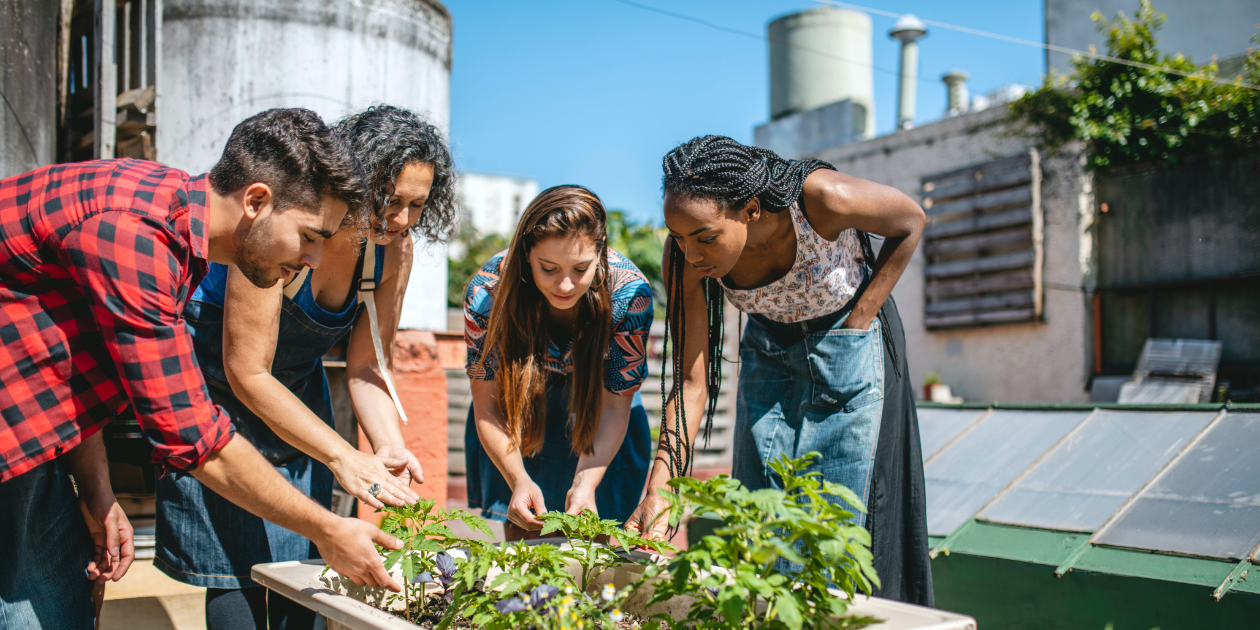Many communities across the country have recognized that they need to take a more active role in their own quality of life. Urban farming and urban gardening are one ways that many cities are addressing this need. These practices not only provide fresh produce for local residents, but they also have a positive impact on mental health and well-being.
Urban farming is defined as “agriculture carried out in large towns and cities with specialized crops for sale, usually at a small scale.” This can include everything from growing vegetables on rooftops to raising chickens or bees in apartment complexes. Cultivating your city has many benefits for both the community and the individual who participates. Let’s explore some of the ways urban farming can positively impact you and your Community Gardening or Shared Gardening Spaces
What is a Shared Gardening or Community Gardening Space?
Community gardens are spaces where people in a community come together to grow food for themselves and for sale. Shared gardens are similar to community gardens, but are typically open to the public and contain both residential and commercial cultivations. Shared gardens typically involve a plot of land that belongs to the owner (either a private resident or small business) on which is placed a long, permanent wooden or metal frame. Inside this frame is a plot of land on which the owner grows vegetables that they give away to other members of the community.


How to Protect Community Gardening or Shared Gardening Spaces
When you want to start a shared gardening space, the first thing you can do is protect your space. Before you even get started, you should contact your local authorities to see if you are allowed to operate a shared gardening space. When you protect your space, you are not only protecting yourself from any legal issues that may arise, but you are also protecting those who may want to use your space. Protect your space by having signs that inform anyone who enters the property what their access restrictions are.


For example, you can put signs up that tell people they can’t pick the tomatoes or cucumbers, but they can help themselves to the carrots. You can also have security fixtures at your entrance like a gate or fence that keeps people out unless you are present. This will help protect your space from vandals who may be looking for an opportunity to break in and steal your goods.
Laws for Community Gardening or Shared Gardening Spaces
In the US, state laws usually govern how shared gardens are governed, so if you are operating in a state where you are not familiar with these laws, you may want to contact the state agency that regulates agriculture and gardening. This will help you determine the correct steps you need to take to operate a safe and compliant shared gardening space. There are a couple things you should know about any laws for shared gardens. First, you should know that there are no federal laws specifically governing shared gardening spaces, and therefore, each state has the authority to create laws around them. This means that you must be compliant with the laws of the state where you are operating.
What Community Gardening or Shared Gardening Spaces brings to the Table
Health Benefits
Growing your own food has many health benefits. Not only does it help improve your diet, but it can assist with weight management and blood sugar control. There are many types of produce that can be grown indoors, including leafy greens that are rich in vitamins A and C, as well as minerals such as iron, potassium, and magnesium. In addition, eating fresh fruits and vegetables daily can boost your immune system, reduce blood pressure, ease constipation, and lower the risk of heart disease and certain cancers.
Urban farming can be a great way to manage your health and prevent illness. It can also be a great way to get back in touch with your community and build a sense of belonging. Many communities host community gardens and cooking classes as a way to connect with one another while also teaching interpersonal skills. When you grow your own food, you are in control of what you eat and are less likely to rely on fast food. This can have a major impact on your physical and emotional health.
Community Building
Many people are concerned about the growing number of people feeling isolated and alone in today’s fast-paced world. One way to combat this is to get involved in your community and cultivate your own backyard. Urban farming in cities offers a unique opportunity to build community and create a sense of belonging. This can be accomplished through various activities, including cultivating produce on your roof, creating a community garden, or hosting a series of community events, such as a farmer’s market.


While urban farming can be a great way to connect with your neighbours, it can also be a great way to learn about new individuals within the community. People of all ages, races, and backgrounds can be found in an urban setting, which provides opportunities to experience different perspectives and build connections across a variety of demographics. Community gardening, on the other hand, can be a great way to create connections among neighbours in a more relaxed setting.
A Sense of Belonging
Growing food can also bring people together in supportive and meaningful ways. Community gardens can be a great place for residents to connect, talk with one another, and learn about new members of their community. Growing food together offers an opportunity to build a sense of belonging and can stimulate positive social interaction. For those who are part of low-income communities or who are living with food insecurity, growing one’s own produce can be a great way to provide for one’s own family while also helping to build a sense of belonging in the community.
Providing fresh produce for other members of the community is a great way to increase access to healthy food and build community.
Pride in Your Neighborhood
As cities become more and more congested and people lose a connection to the outdoors, cultivating your own backyard and sharing that product with your neighbours can help provide a source of pride. This can be especially helpful for those who are living with low socioeconomic status (SES) or who are experiencing food insecurity. When people grow their own food, they are able to take pride in their own efforts, which can help to foster more positive self-esteem. Urban farming can also help to increase a sense of belonging in a community.
In an urban setting, cultivating your own backyard can help to foster a sense of belonging as well as provide a source of pride in your neighbourhood. When people grow their own food, they are also able to provide food for their neighbours, which can foster a sense of belonging.
Economic Benefits
Besides improving your overall health, farming can also provide a source of income. There are many ways to monetize your urban farming efforts, such as growing herbs for a commercial herb company or selling produce at local farmer’s markets. Whatever approach you take, it is important to keep in mind that urban farming can be a great way to improve your economic well-being. Urban farming can lead to multiple forms of employment, including positions as a horticulturist, educator, or consultant.
The Benefits of Community Gardening or Shared Gardening Spaces
There are many benefits to growing your own food, but did you know that you can protect those who use your garden with laws? If you have a shared garden, you can protect your space by keeping the area clean, restricting access to all people, and keeping any trespassing to a minimum. Another great benefit to a shared gardening space is that it can be a great way to meet new people in your community.


In many communities, there are not many options for people to interact with each other, so finding people to partner up with on a gardening project can be a really great way to make some new friends while also providing food to your community.
The Disadvantages of Community Gardening or Shared Gardening Spaces
While there are many benefits to operating a shared garden, there are also some disadvantages. One of the disadvantages of Shared Gardening Spaces is that they can be messy and smelly affairs. You and your neighbours will oftentimes be gathered in the shared garden, using the space, so it’s important that your shared garden is clean and well-maintained. Also, since shared gardens are often open to the public, you need to be careful about keeping them safe.
Summing up
The benefits of gardening are almost endless. Not only do you get the pleasure of seeing your plants grow, but you also get to eat some of the fruits and veggies that you grew. Shared gardens are also a great way to meet new people and protect your space from vandals. However, there are some disadvantages to a shared garden, like being messy and unsafe. If you are interested in starting a shared garden in your community, it’s important to know the laws to protect your space and your community members.








